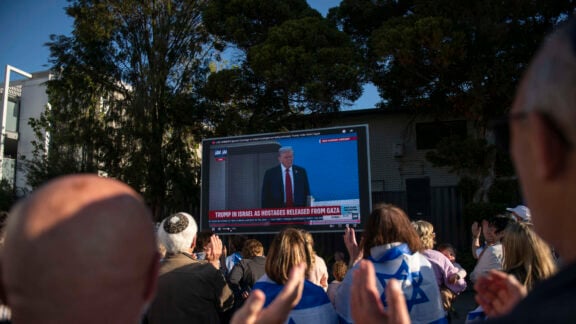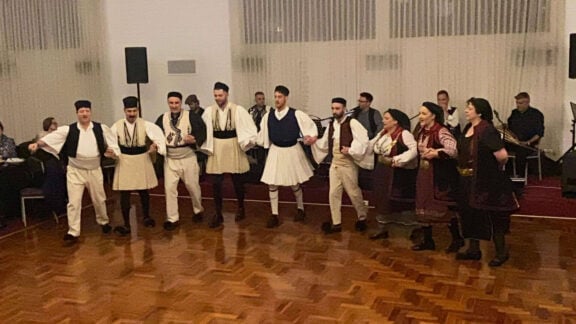Theodoros Tsiakilos delivered a presentation on his book ‘Journey to Prasino of Arcadia. What I heard, learned and remember’, delving deep into the history of his village of origin this Sunday in Melbourne.
The presentation was organised by the Hellenic Writers’ Association of Australia and the Prasino Association of Melbourne at 2pm last Sunday in the hall of the Panarcadian Association of Melbourne and Victoria ‘O Kolokotronis’ at 570 Victoria Street, North Melbourne.
Among the speakers for the event will also be writer Nikos Piperis and Neos Kosmos‘ editor in chief Sotiris Hatzimanolis, with Odysseas Kripotos to serve as MC.
The book covers the work of Theodoros Tsiakilos, a resident of Melbourne since 1985, as he has carefully collected historical, ethnological, folklore and linguistic data and recorded a journey through the beautiful Arcadian village of yesterday and today.
The author captures in his book the history of his village of origin, ensuring a lasting memory is recorded. It also includes poems written by a then Year 9 student, Galanogiannis (aka Yannis Katsimalis) during the 1938-39 school year, as well as the diary of Kostas Tsiakilos, written when he was a Year 5 student in 1965.
The book features a collection of photos as well as a dictionary listing words (Turkish, Venetian, Slavic, Arvanitic) and expressions of the region.

Tsiakilos stressed that the goal of the book is to allow readers to go back in time and learn about the history of the village that is from a bygone era.
“It is an attempt to bridge the past with the present with scarce material from oral and written testimonies for the earlier years but abundant for the more recent ones,” the author said.
“For as time passes, it brings oblivion, erasing from the mind memories, events, knowledge, people, families, villages, towns, cities, nations.”
Who is Theo Tsiakilos and what does his “Journey to Prasino” stand for?
As a member of the Prasino Committee, I had the honour of presenting at the launch of the book “Journey to Prasino.”
Speaking on behalf of the Committee and its members, I was asked by our esteemed President and author, Theo Tsiakilos, to say a few words about his book.
As someone of Prasino origin and Australian-born, Theo requested that I craft a speech on behalf of The Melbourne Prasino Club.
On the surface, producing a few paragraphs seemed like a straightforward task. However, if you know me, you know that when I take on a task, I need to cover every angle: the why, the where, the how, and the what. It can’t be one-dimensional; I need the facts and the emotion. I take an all-embracing approach to ensure I’m satisfied with the result.
What started as writing a ‘few words’ became more complex, much like opening boxes in the garage.

What initially seemed like junk turned out to reflect memories and moments that remind you of who you are.
Born in Australia but with deep connections to my ancestral village Prasino, it was far more difficult to write about the book and the author as Theo had asked.
Should I talk about my long-standing relationship with Theo, marked by periods of unexplained absences over our 40 years of knowing each other?
Or should I dive straight into the journey the book takes its readers on, delving into memories, historical facts, geographical wonders, social connections, and the nuances that made the village what it is today? Ultimately, I decided to cover both aspects: my relationship with Theo and the rich history outlined in his book, ‘Journey to Prasino’.
To do one without the other would have been an injustice. It was essential to explore the connections that brought us to this day – the inaugural book launch.

Long time memories
I met Theo as a 15-year-old when he had newly arrived in Australia after marrying my first cousin, Dimitra Giovas. Theo, an ‘educated’ man with a university degree, was instantly elevated to almost celebrity status among our relatives and friends, who were mostly factory workers and small business owners.
With grace and humility, he commanded attention and respect, joining various clubs and organisations to nurture the Greek spirit he found alive and well in Australia. He set up a business and worked hard to create his own wealth and good fortune.
At that time, I was a teenager channeling Madonna’s ‘Like a Virgin’ days, and Theo seemed overconfident with a Greek swagger unfamiliar to us in Australia. We both went on our separate paths, connected only by our roots in Prasino.
This connection to our village provided a cushion of identity and belonging, especially in Australia, where we were seen as immigrant Greeks and in Greece, where we were viewed as Aussie or ‘xenoi’ (foreigners).
Years passed, and we reconnected as members of the Prasino Brotherhood committee. Writing this speech, I realised that although I had known Theo for over 40 years, I had not deeply known the true Theo until recently. These ‘wog clubs,’ as we called them growing up, linger in the background of your life, connecting you to familiar faces and shared memories.

In front of us today stands a man of incredible integrity, with a deep love for his family, friends, heritage, and particularly his quaint village Prasino.
A small dot on the map of Greece, Prasino holds stories of joy, pain, tradition, resistance, and heroism. Theo’s book recounts the proud population’s refusal to be defined by poverty and desperation.
In Theo’s words, “the villagers truly cared for and loved one another”.
Ernest Hemingway famously said, “There is nothing to writing. All you do is sit down at a typewriter and bleed.”
Following a near-fatal heart attack, Theo was ordered to complete bed rest for 12 months, during which he started reading old newspapers from Prasino and talking to villagers. Many had wanted to write a book but never started. Theo’s heart attack became the genesis of ‘Journey to Prasino’.
This book inspires not only me and my generation but also future generations.
It’s not about Theo’s experiences; selflessly, he has written about all the families of the village, connecting us through storytelling.
His book has sparked conversations and connections that might not have happened otherwise. It is our story, and by telling it, we keep our history alive across generations.
As a committee, we are immensely proud of our President. Theo has helped us reconnect with friends, family, and strangers through ‘Journey to Prasino’.
The result of all your hard work, Theo, is right here in this book – an enduring legacy of your talent and commitment. I loved reading it, and I encourage everyone to do the same.










